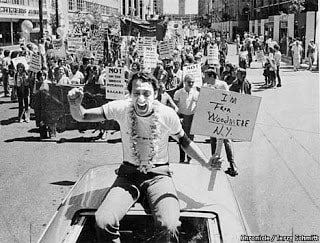I was one of several people who spoke on a range of topics related to pending trans legislation, from an overview of the national and state movement for trans equality, to how we are all impacted by the gender binary, trans or not. After the speeches, we marched down from the State House, to Government Center, to Downtown Crossing and then back up the State House, providing Saturday shoppers with an unexpected interlude.
I pray and, in the tradition of Harvey, hope that our legislators will hear us and finally get ENDA and the Massachusetts Trans Civil Rights Bill out of committee and passed.
CP
JTIMA Harvey Milk Day Rally for Transgender Equality
State House Steps, Boston, MA
Saturday, May 22, 2010
Hope from Harvey Milk
In his book The Mayor of Castro Street: the Life and Times of Harvey Milk, openly gay journalist Randy Shilts (may he rest in peace) described a San Francisco Sunday morning scene in 1978 when, with Harvey Milk sitting in the back pew, the Reverend William Barcus, priest of St. Mary the Virgin Episcopal Church, got up and denounced Proposition 6. This “Briggs Initiative” called for the removal of gay and lesbian people and possibly even their supporters from working in the California public schools. In an unusual move for a priest in that context, Barcus not only spoke of the God who stands with the marginalized, not only berated the fear-mongering, dehumanizing rhetoric of the Initiative and its backers, but he also witnessed to these truths with his own life, coming out as a gay man. He challenged people to, as he put it, “morally put yourself on the line, not after the fact, not after November 7th, but now” (pp. 241-242; for more on Rev. Barcus's sermon, see this LGBT chronology for the Episcopal Diocese of California by Rev. Kathleen McAdams).
On that morning I was across the Bay in Berkeley where I grew up, possibly in Sunday school, possibly sleeping in. I had no idea of the import of what was going on across the Bay and around my state. I was a shy new kindergartener, a little girl growing up to be a trans man, a spouse, a dad, an academic and an Episcopal priest. What Harvey Milk inspired in William Barcus and countless others, I too came to appreciate as one who also knows something of what it feels like to be dehumanized.
What Harvey Milk goaded us into remembering with relentless wit and grit is the crucial importance of hope. Hope. “You gotta give ‘em hope,” he said again and again. He wasn’t the biggest fan of organized religion so-called, but by God he knew how to preach. Hope, he knew, is as essential to human life as the air we breathe, the food we eat and the water we drink. Without hope we shrink into ourselves, our capacities squandered, our stature cut short. Our ability to hope, as human beings, is intimately tied to our dignity.
When others deny transgender people our dignity, they attack the heart of our humanity. This happens as much in quiet, behind the scenes ways as in the bold, openly violent ways we mark every year at Trans Day of Remembrance. I am thinking of the violence of intentionally identifying us with wrong names and pronouns; the violence of quietly tossing our resumes in the proverbial circular file; of falsely telling us the apartment is already rented; of telling us we must wait our turn to ensure being treated with dignity and respect; and particularly in this climate, of shamelessly labeling legislation that would safeguard our basic civil rights a “bathroom bill.”
I’m honestly not sure how much transgender people were on Harvey’s radar in the late seventies, but I have no doubt that our struggle today would inspire and galvanize him. He would tell us that no matter what indignities we have suffered, no matter who might have rejected us, we do not have the option of giving up hope. In his Hope Speech, he said, “if there is a message I have to give… it's the fact that if a gay person can be elected, it's a green light. And you and you and you, you have to give people hope.” Harvey knew his election was a foot in the door for all who are marginalized. But he also knew that the hope he inspired was not automatic. It was something he called on each person in his audience to give. And I would submit, Harvey’s legacy renders that hope as something we must also claim.
The program for his memorial service at the San Francisco Opera House contained a line from Victor Hugo that he had recently hand-copied and posted on the wall of his office: “All the forces in the world are not so powerful as an idea whose time has come” (Shilts, 286). Trans people of Massachusetts, from around the nation and indeed the world, partners, allies, families and friends, lawmakers, people of all faiths: the time for full equality for transgender people has indeed come. The time is now for all of us — and particularly, I would say, for religious leaders of all traditions— to “morally put ourselves on the line,” as Reverend Barcus put it, for the dignity that is our birthright. The time is now for our legislators beneath this gleaming dome to finally take up the Massachusetts Transgender Civil Rights Bill, and for our legislators in Washington to take up ENDA, and pass them. Thank you.
CP


 RSS Feed
RSS Feed